
Apollo
Multilingual Medicine: Model, Dataset, Benchmark, Code
Stars: 155
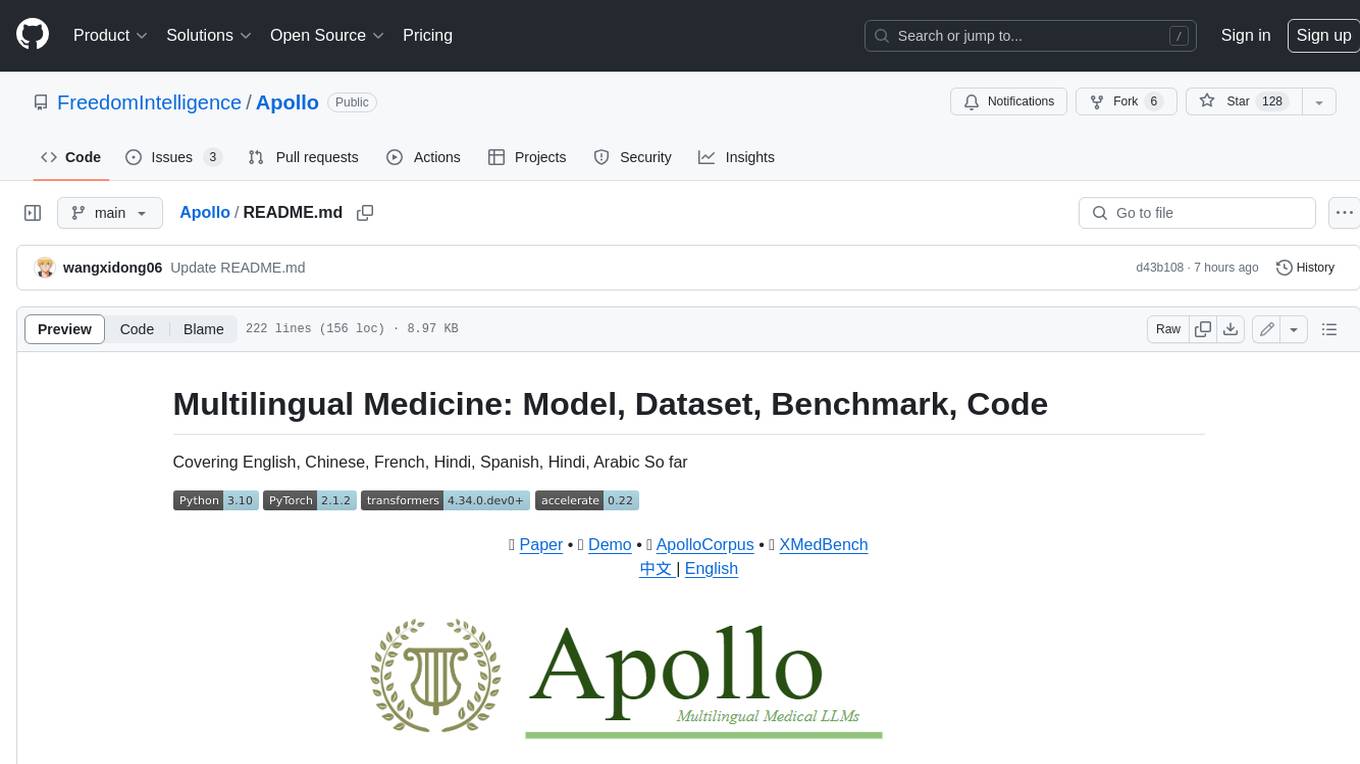
Apollo is a multilingual medical LLM that covers English, Chinese, French, Hindi, Spanish, Hindi, and Arabic. It is designed to democratize medical AI to 6B people. Apollo has achieved state-of-the-art results on a variety of medical NLP tasks, including question answering, medical dialogue generation, and medical text classification. Apollo is easy to use and can be integrated into a variety of applications, making it a valuable tool for healthcare professionals and researchers.
README:
Covering English, Chinese, French, Hindi, Spanish, Hindi, Arabic So far
📃 Paper • 🌐 Demo • 🤗 ApolloCorpus • 🤗 XMedBench
中文 | English
- [2024.04.25] MedJamba released, train and evaluation code refer to repo.
- [2024.03.07] Paper released.
- [2024.02.12] ApolloCorpus and XMedBench is published!🎉
- [2024.01.23] Apollo repo is published!🎉
🤗 Apollo-0.5B • 🤗 Apollo-1.8B • 🤗 Apollo-2B • 🤗 Apollo-6B • 🤗 Apollo-7B • 🤗 Apollo-34B • 🤗 Apollo-72B
🤗 MedJamba
🤗 Apollo-0.5B-GGUF • 🤗 Apollo-2B-GGUF • 🤗 Apollo-6B-GGUF • 🤗 Apollo-7B-GGUF
- 0.5B, 1.8B, 2B, 6B, 7B: User:{query}\nAssistant:{response}<|endoftext|>
- 34B, 72B: <|User|>:{query}\n<|Assistant|>:{response}<|endoftext|>
-
Dataset 🤗 ApolloCorpus
Click to expand
- Zip File
-
Data category
- Pretrain:
- data item:
- json_name: {data_source}{language}{data_type}.json
- data_type: medicalBook, medicalGuideline, medicalPaper, medicalWeb(from online forum), medicalWiki
- language: en(English), zh(chinese), es(spanish), fr(french), hi(Hindi)
- data_type: qa(generated qa from text)
- data_type==text: list of string
[ "string1", "string2", ... ] - data_type==qa: list of qa pairs(list of string)
[ [ "q1", "a1", "q2", "a2", ... ], ... ]
- data item:
- SFT:
- json_name: {data_source}_{language}.json
- data_type: code, general, math, medicalExam, medicalPatient
- data item: list of qa pairs(list of string)
[ [ "q1", "a1", "q2", "a2", ... ], ... ]
- Pretrain:
-
Evaluation 🤗 XMedBench
Click to expand
-
EN:
- MedQA-USMLE
- MedMCQA
- PubMedQA: Because the results fluctuated too much, they were not used in the paper.
-
MMLU-Medical
- Clinical knowledge, Medical genetics, Anatomy, Professional medicine, College biology, College medicine
-
ZH:
- MedQA-MCMLE
-
CMB-single: Not used in the paper
- Randomly sample 2,000 multiple-choice questions with single answer.
-
CMMLU-Medical
- Anatomy, Clinical_knowledge, College_medicine, Genetics, Nutrition, Traditional_chinese_medicine, Virology
-
CExam: Not used in the paper
- Randomly sample 2,000 multiple-choice questions
-
ES: Head_qa
-
FR: Frenchmedmcqa
-
HI: MMLU_HI
- Clinical knowledge, Medical genetics, Anatomy, Professional medicine, College biology, College medicine
-
AR: MMLU_Ara
- Clinical knowledge, Medical genetics, Anatomy, Professional medicine, College biology, College medicine
-
Click to expand
We take Gemma-2b as example
-
Download Dataset for project:
bash 0.download_data.sh -
Prepare test and dev for specific model:
- Create test data for with special token, you can use ./util/check.ipynb to check models' special tokens
bash 1.data_process_test&dev.sh -
Prepare train data for specific model (Create tokenized data in advance):
- You can adjust data Training order and Training Epoch in this step
bash 2.data_process_train.sh -
Train the model
- If you want to train in Multi Nodes please refer to ./scripts/multi_node_train_*.sh
bash 3.single_node_train_gemma.sh -
(Optional) Proxy-Tuning: Directly improve model capabilities without fine-tuning
bash src/proxy-tuning/scripts/eval/proxy_tuning.sh -
Evaluate your model: Generate score for benchmark
bash 4.eval.sh -
Evaluate your model: Play with your ckpts in bash
python ./src/evaluate/cli_demo.py --model_name='./ckpts/your/path/tfmr'
Please use the following citation if you intend to use our dataset for training or evaluation:
@misc{wang2024apollo,
title={Apollo: Lightweight Multilingual Medical LLMs towards Democratizing Medical AI to 6B People},
author={Xidong Wang and Nuo Chen and Junyin Chen and Yan Hu and Yidong Wang and Xiangbo Wu and Anningzhe Gao and Xiang Wan and Haizhou Li and Benyou Wang},
year={2024},
eprint={2403.03640},
archivePrefix={arXiv},
primaryClass={cs.CL}
}
For Tasks:
Click tags to check more tools for each tasksFor Jobs:
Alternative AI tools for Apollo
Similar Open Source Tools

Apollo
Apollo is a multilingual medical LLM that covers English, Chinese, French, Hindi, Spanish, Hindi, and Arabic. It is designed to democratize medical AI to 6B people. Apollo has achieved state-of-the-art results on a variety of medical NLP tasks, including question answering, medical dialogue generation, and medical text classification. Apollo is easy to use and can be integrated into a variety of applications, making it a valuable tool for healthcare professionals and researchers.
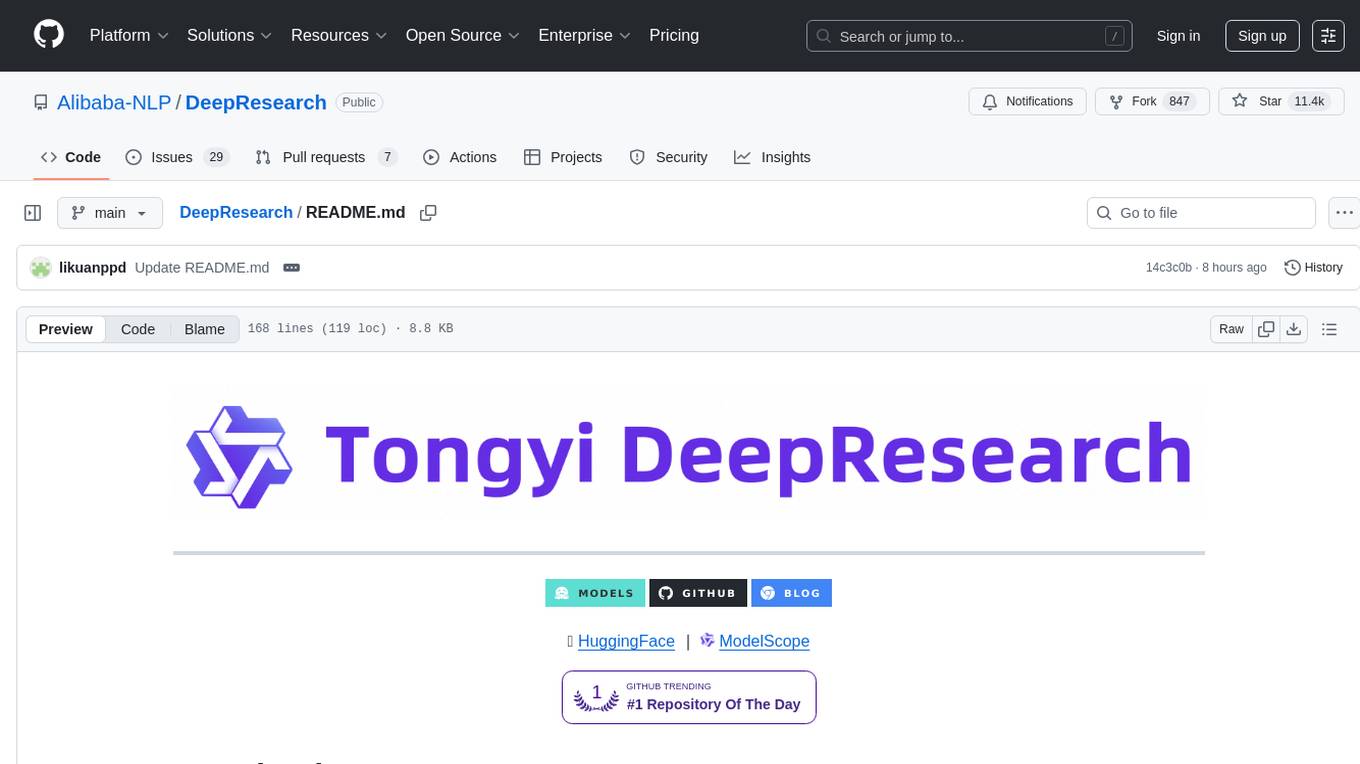
DeepResearch
Tongyi DeepResearch is an agentic large language model with 30.5 billion total parameters, designed for long-horizon, deep information-seeking tasks. It demonstrates state-of-the-art performance across various search benchmarks. The model features a fully automated synthetic data generation pipeline, large-scale continual pre-training on agentic data, end-to-end reinforcement learning, and compatibility with two inference paradigms. Users can download the model directly from HuggingFace or ModelScope. The repository also provides benchmark evaluation scripts and information on the Deep Research Agent Family.
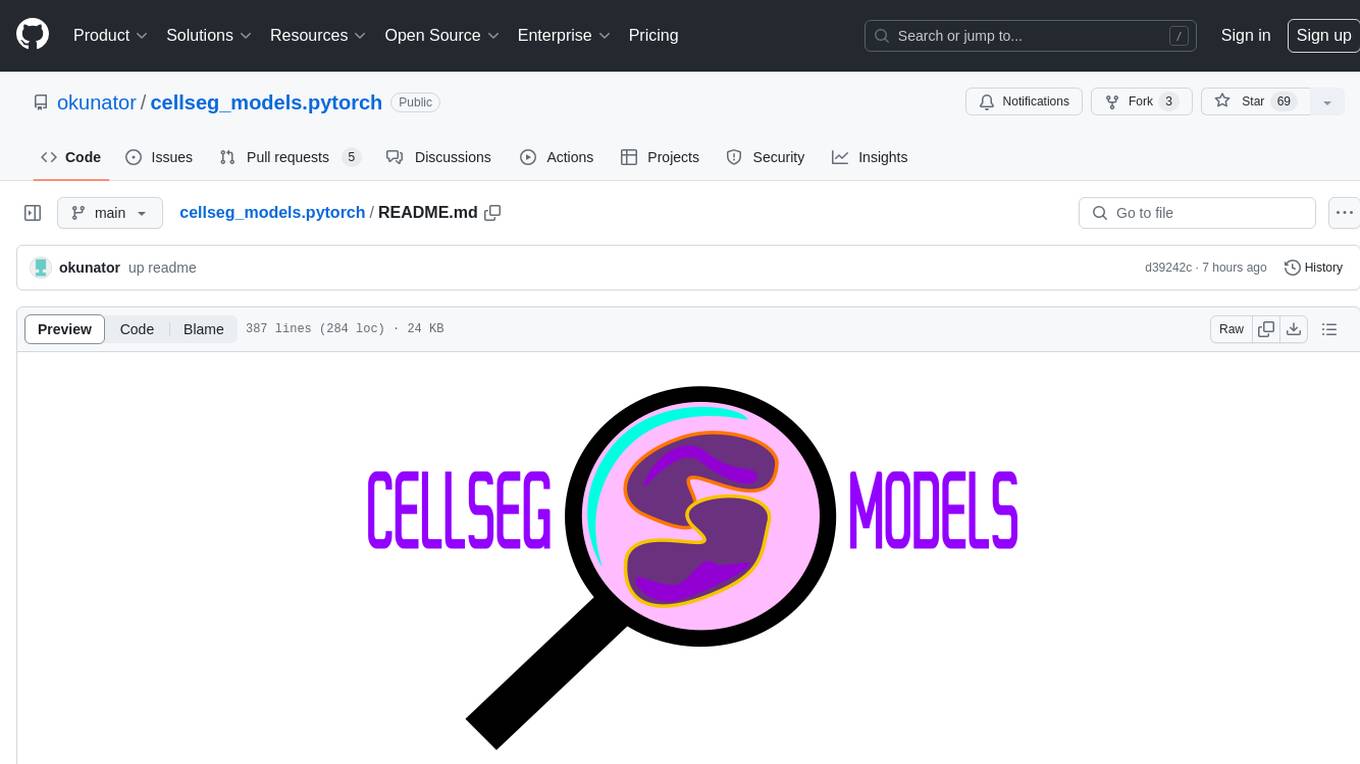
cellseg_models.pytorch
cellseg-models.pytorch is a Python library built upon PyTorch for 2D cell/nuclei instance segmentation models. It provides multi-task encoder-decoder architectures and post-processing methods for segmenting cell/nuclei instances. The library offers high-level API to define segmentation models, open-source datasets for training, flexibility to modify model components, sliding window inference, multi-GPU inference, benchmarking utilities, regularization techniques, and example notebooks for training and finetuning models with different backbones.
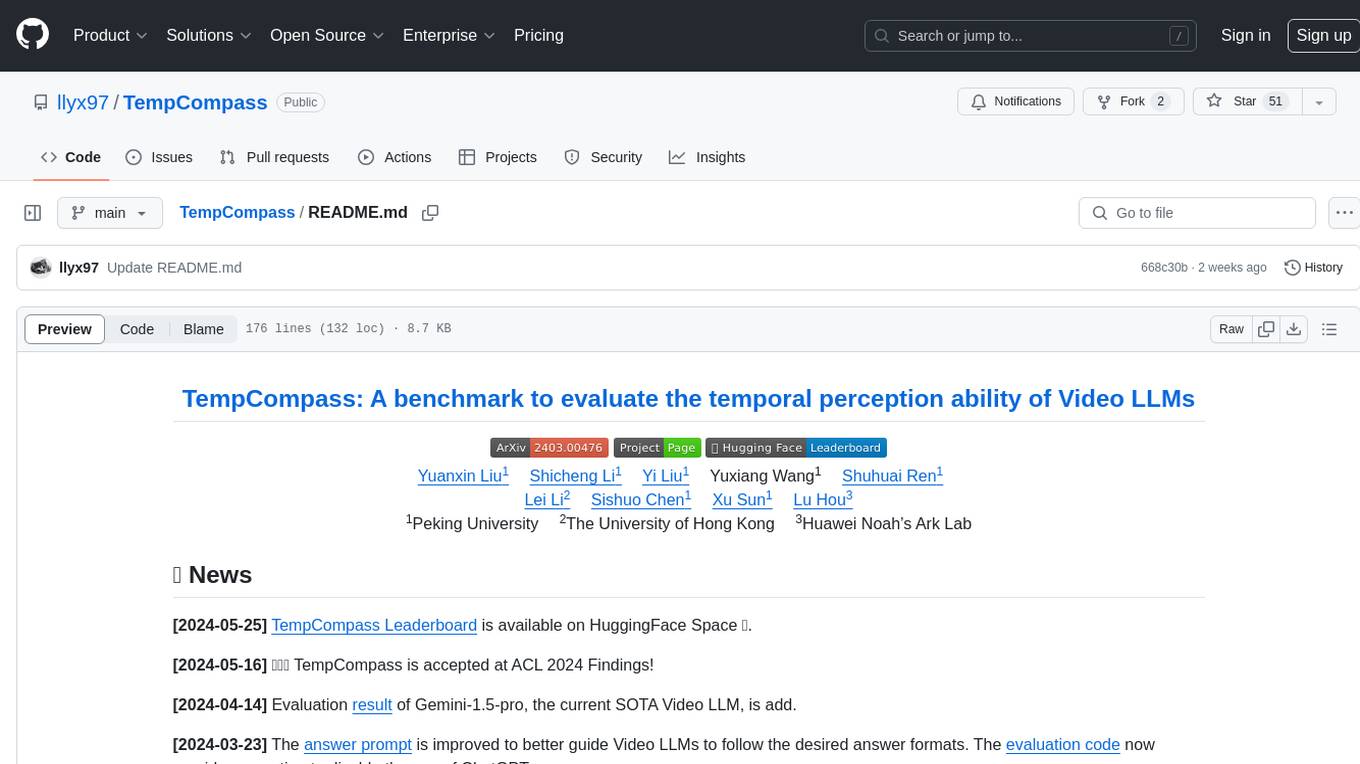
TempCompass
TempCompass is a benchmark designed to evaluate the temporal perception ability of Video LLMs. It encompasses a diverse set of temporal aspects and task formats to comprehensively assess the capability of Video LLMs in understanding videos. The benchmark includes conflicting videos to prevent models from relying on single-frame bias and language priors. Users can clone the repository, install required packages, prepare data, run inference using examples like Video-LLaVA and Gemini, and evaluate the performance of their models across different tasks such as Multi-Choice QA, Yes/No QA, Caption Matching, and Caption Generation.
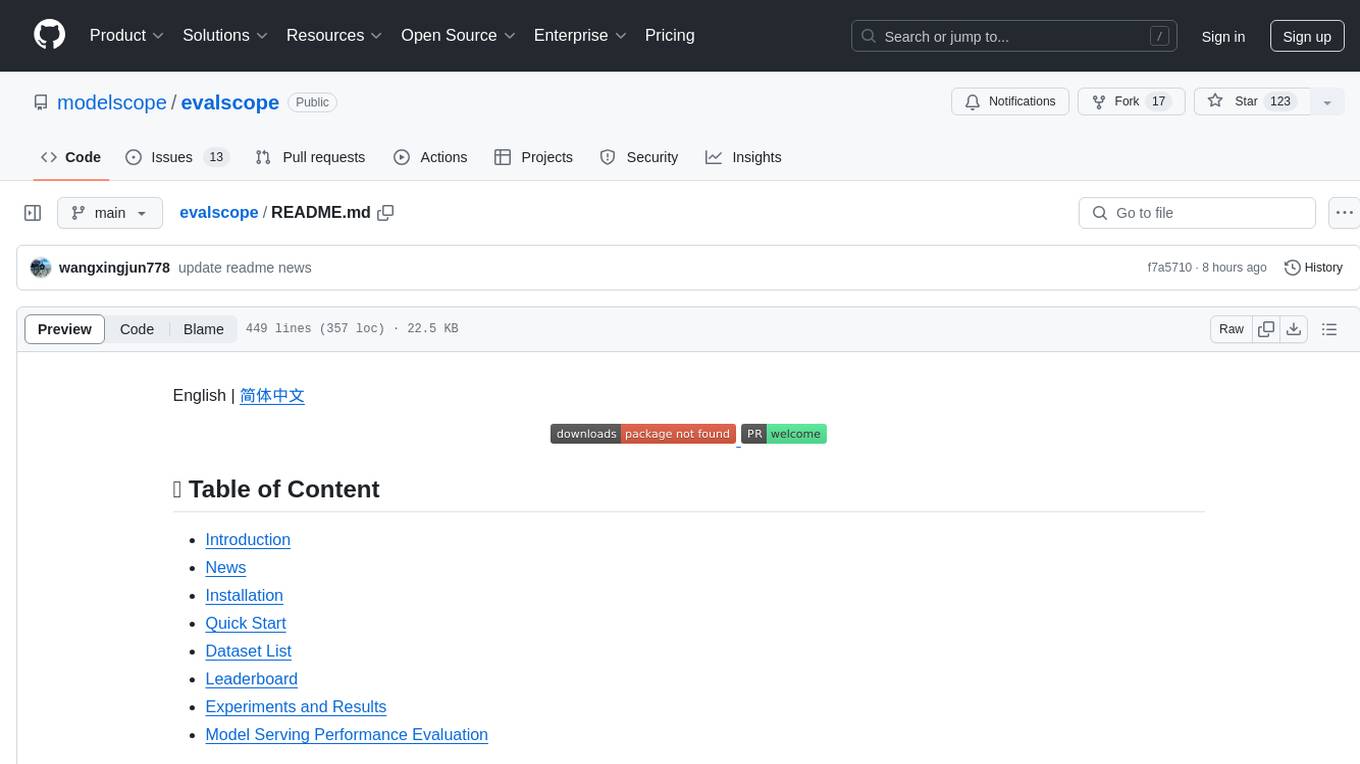
evalscope
Eval-Scope is a framework designed to support the evaluation of large language models (LLMs) by providing pre-configured benchmark datasets, common evaluation metrics, model integration, automatic evaluation for objective questions, complex task evaluation using expert models, reports generation, visualization tools, and model inference performance evaluation. It is lightweight, easy to customize, supports new dataset integration, model hosting on ModelScope, deployment of locally hosted models, and rich evaluation metrics. Eval-Scope also supports various evaluation modes like single mode, pairwise-baseline mode, and pairwise (all) mode, making it suitable for assessing and improving LLMs.
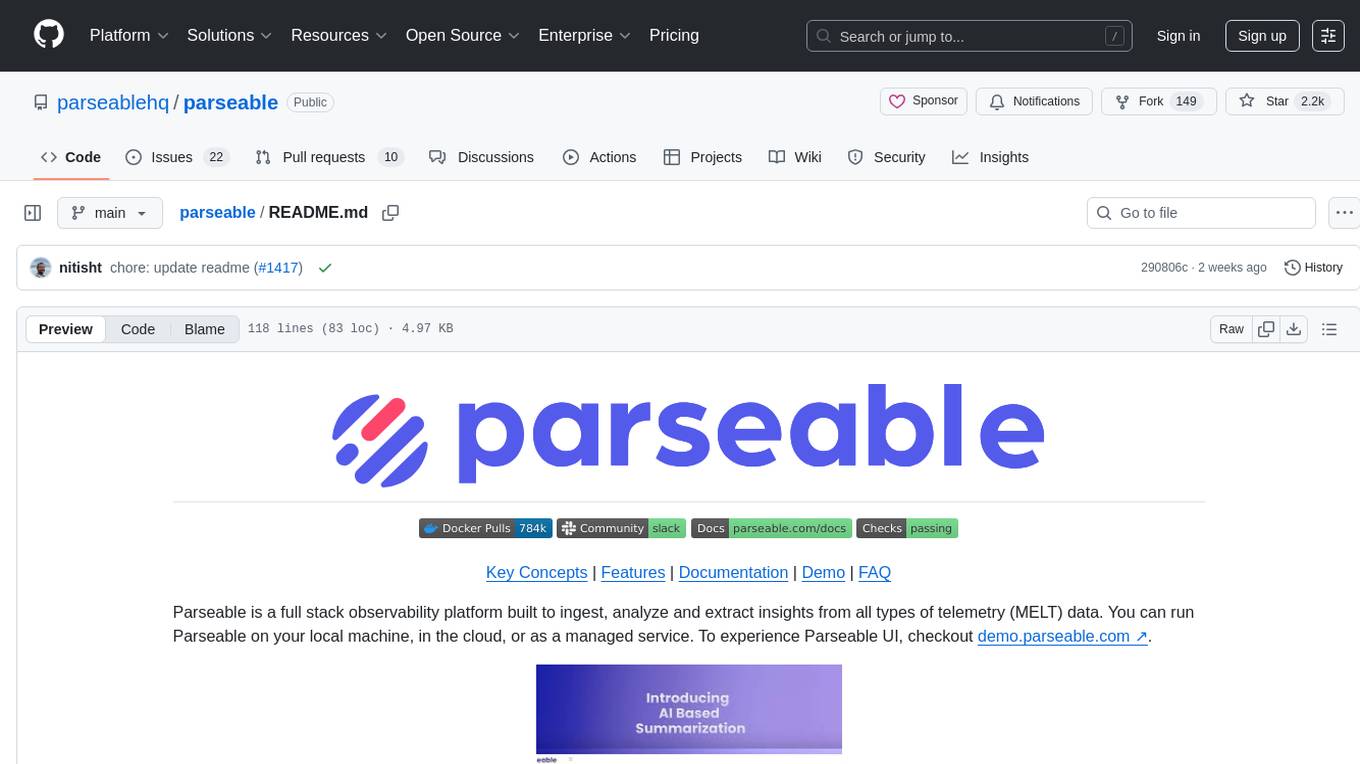
parseable
Parseable is a full stack observability platform designed to ingest, analyze, and extract insights from various types of telemetry data. It can be run locally, in the cloud, or as a managed service. The platform offers features like high availability, smart cache, alerts, role-based access control, OAuth2 support, and OpenTelemetry integration. Users can easily ingest data, query logs, and access the dashboard to monitor and analyze data. Parseable provides a seamless experience for observability and monitoring tasks.
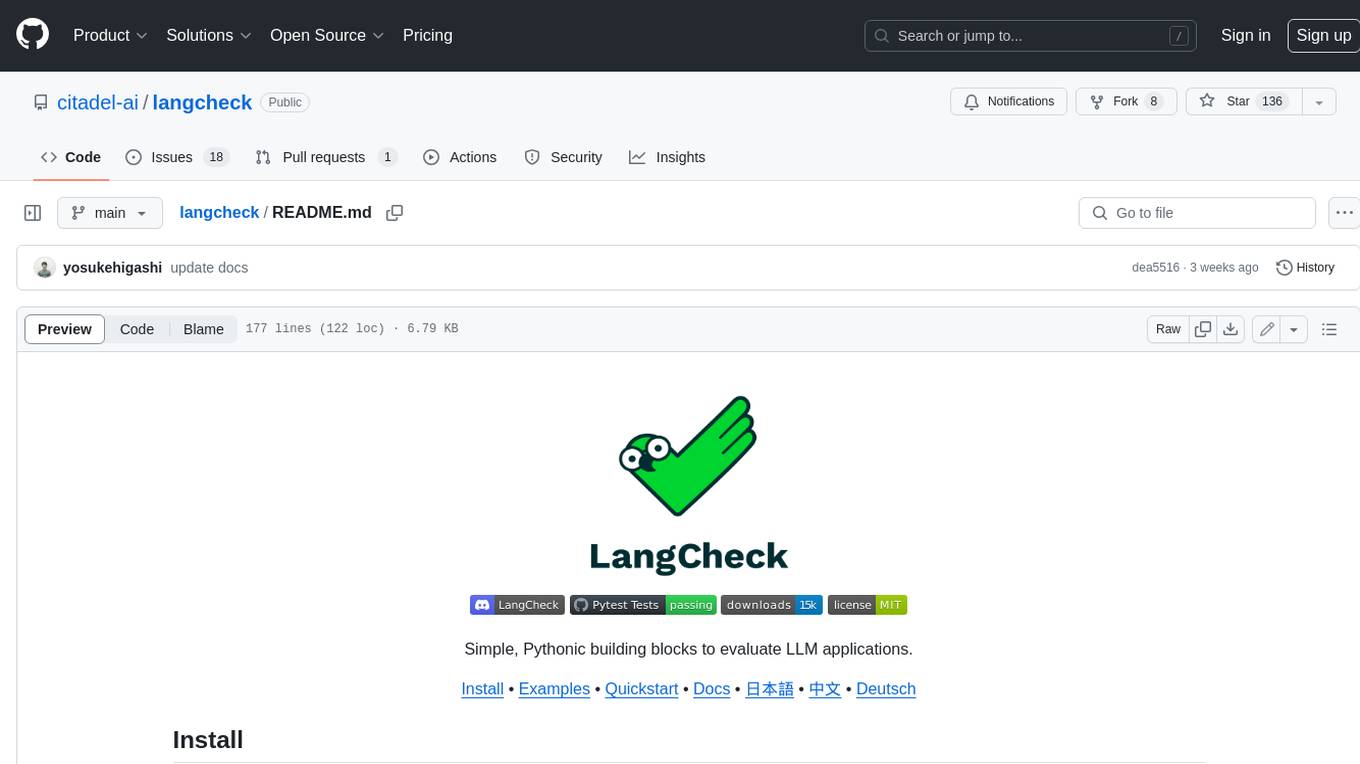
langcheck
LangCheck is a Python library that provides a suite of metrics and tools for evaluating the quality of text generated by large language models (LLMs). It includes metrics for evaluating text fluency, sentiment, toxicity, factual consistency, and more. LangCheck also provides tools for visualizing metrics, augmenting data, and writing unit tests for LLM applications. With LangCheck, you can quickly and easily assess the quality of LLM-generated text and identify areas for improvement.
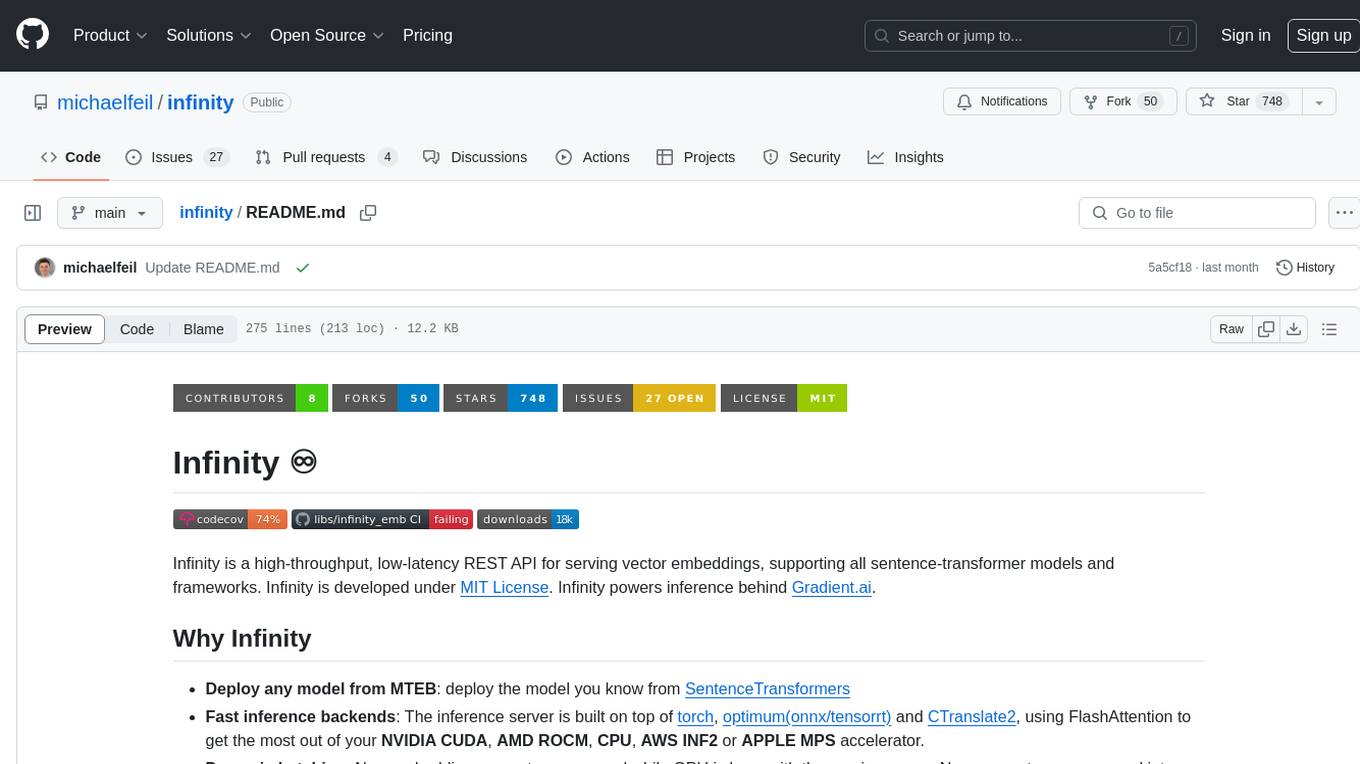
infinity
Infinity is a high-throughput, low-latency REST API for serving vector embeddings, supporting all sentence-transformer models and frameworks. It is developed under the MIT License and powers inference behind Gradient.ai. The API allows users to deploy models from SentenceTransformers, offers fast inference backends utilizing various accelerators, dynamic batching for efficient processing, correct and tested implementation, and easy-to-use API built on FastAPI with Swagger documentation. Users can embed text, rerank documents, and perform text classification tasks using the tool. Infinity supports various models from Huggingface and provides flexibility in deployment via CLI, Docker, Python API, and cloud services like dstack. The tool is suitable for tasks like embedding, reranking, and text classification.
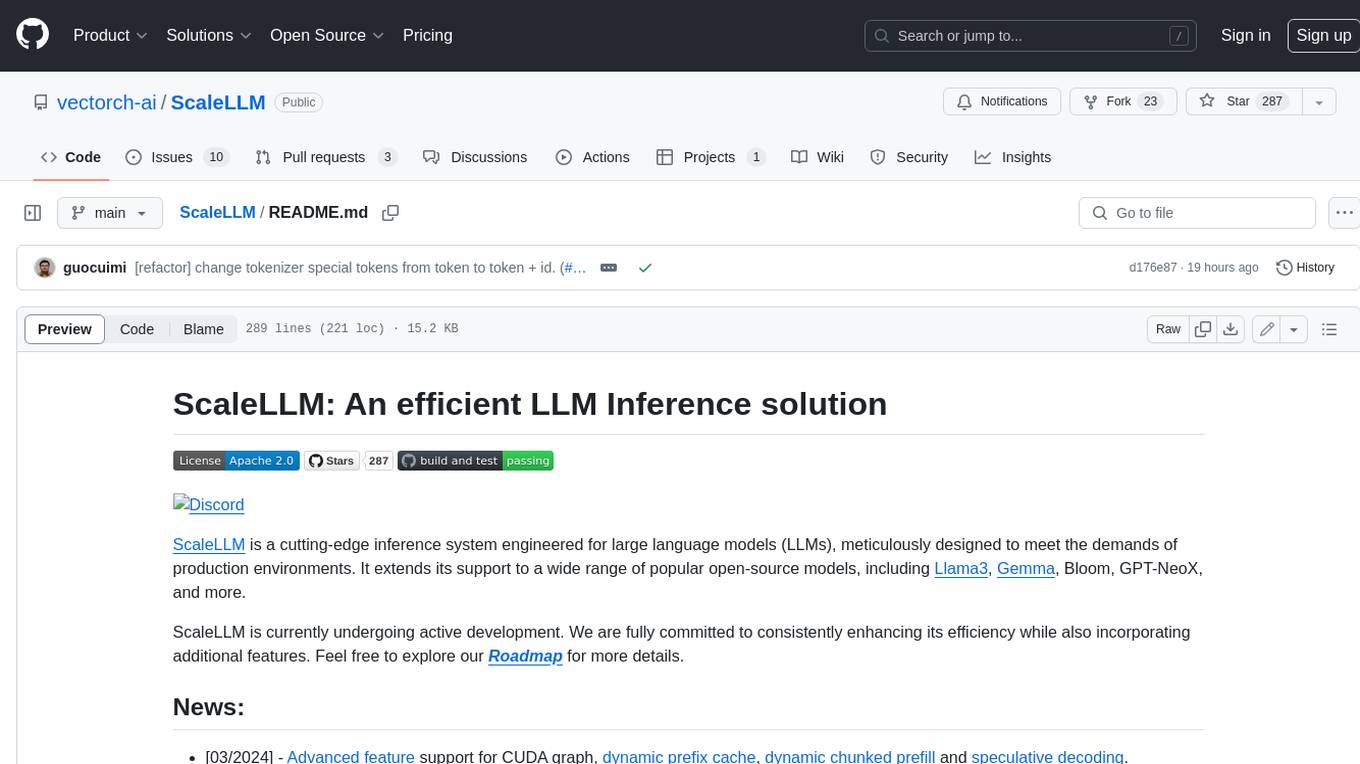
ScaleLLM
ScaleLLM is a cutting-edge inference system engineered for large language models (LLMs), meticulously designed to meet the demands of production environments. It extends its support to a wide range of popular open-source models, including Llama3, Gemma, Bloom, GPT-NeoX, and more. ScaleLLM is currently undergoing active development. We are fully committed to consistently enhancing its efficiency while also incorporating additional features. Feel free to explore our **_Roadmap_** for more details. ## Key Features * High Efficiency: Excels in high-performance LLM inference, leveraging state-of-the-art techniques and technologies like Flash Attention, Paged Attention, Continuous batching, and more. * Tensor Parallelism: Utilizes tensor parallelism for efficient model execution. * OpenAI-compatible API: An efficient golang rest api server that compatible with OpenAI. * Huggingface models: Seamless integration with most popular HF models, supporting safetensors. * Customizable: Offers flexibility for customization to meet your specific needs, and provides an easy way to add new models. * Production Ready: Engineered with production environments in mind, ScaleLLM is equipped with robust system monitoring and management features to ensure a seamless deployment experience.
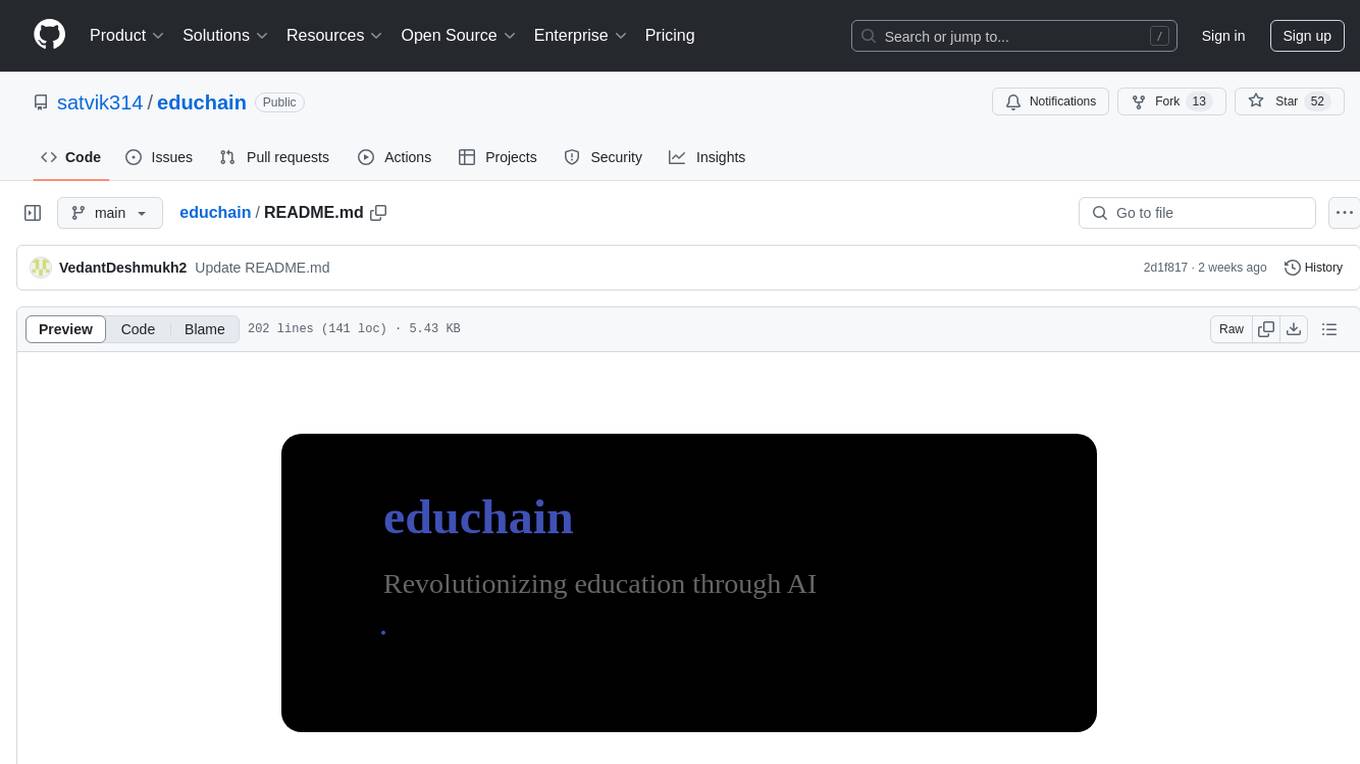
educhain
Educhain is a powerful Python package that leverages Generative AI to create engaging and personalized educational content. It enables users to generate multiple-choice questions, create lesson plans, and support various LLM models. Users can export questions to JSON, PDF, and CSV formats, customize prompt templates, and generate questions from text, PDF, URL files, youtube videos, and images. Educhain outperforms traditional methods in content generation speed and quality. It offers advanced configuration options and has a roadmap for future enhancements, including integration with popular Learning Management Systems and a mobile app for content generation on-the-go.
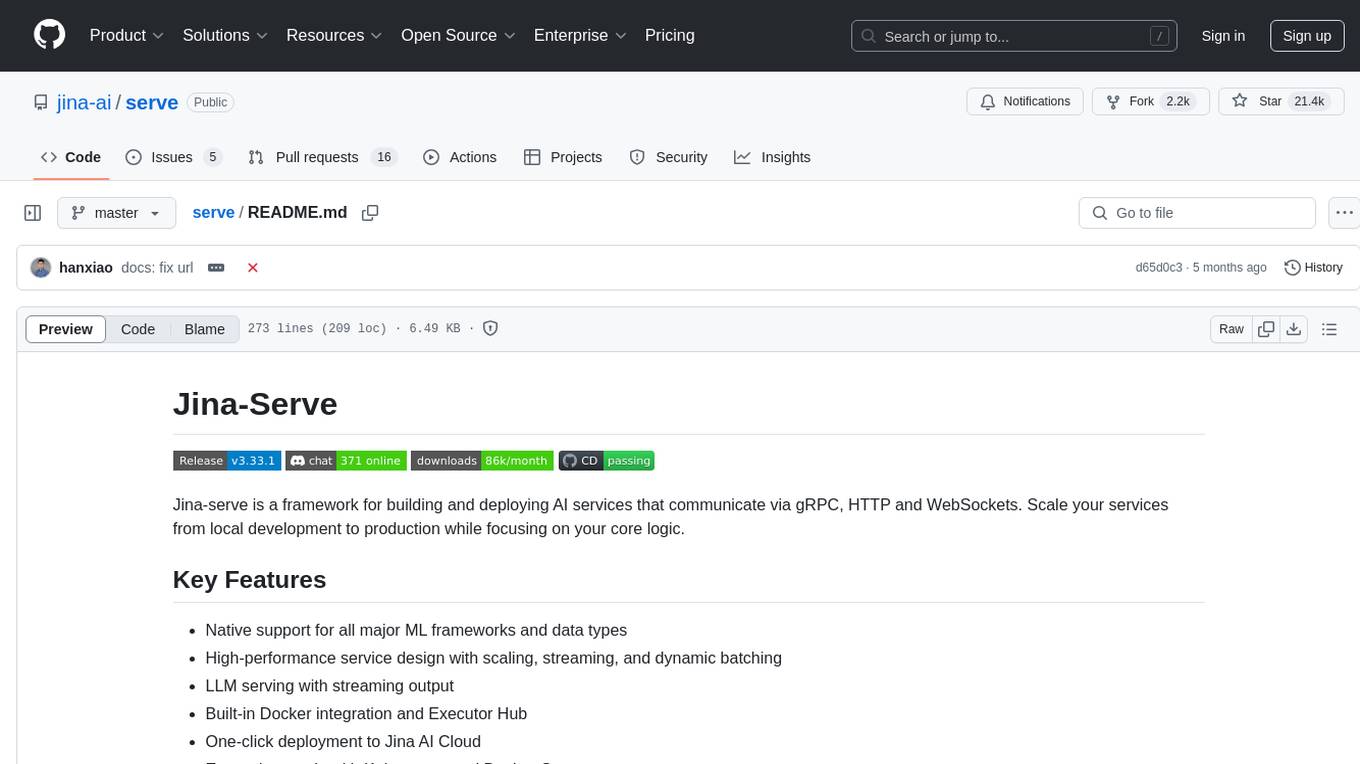
serve
Jina-Serve is a framework for building and deploying AI services that communicate via gRPC, HTTP and WebSockets. It provides native support for major ML frameworks and data types, high-performance service design with scaling and dynamic batching, LLM serving with streaming output, built-in Docker integration and Executor Hub, one-click deployment to Jina AI Cloud, and enterprise-ready features with Kubernetes and Docker Compose support. Users can create gRPC-based AI services, build pipelines, scale services locally with replicas, shards, and dynamic batching, deploy to the cloud using Kubernetes, Docker Compose, or JCloud, and enable token-by-token streaming for responsive LLM applications.
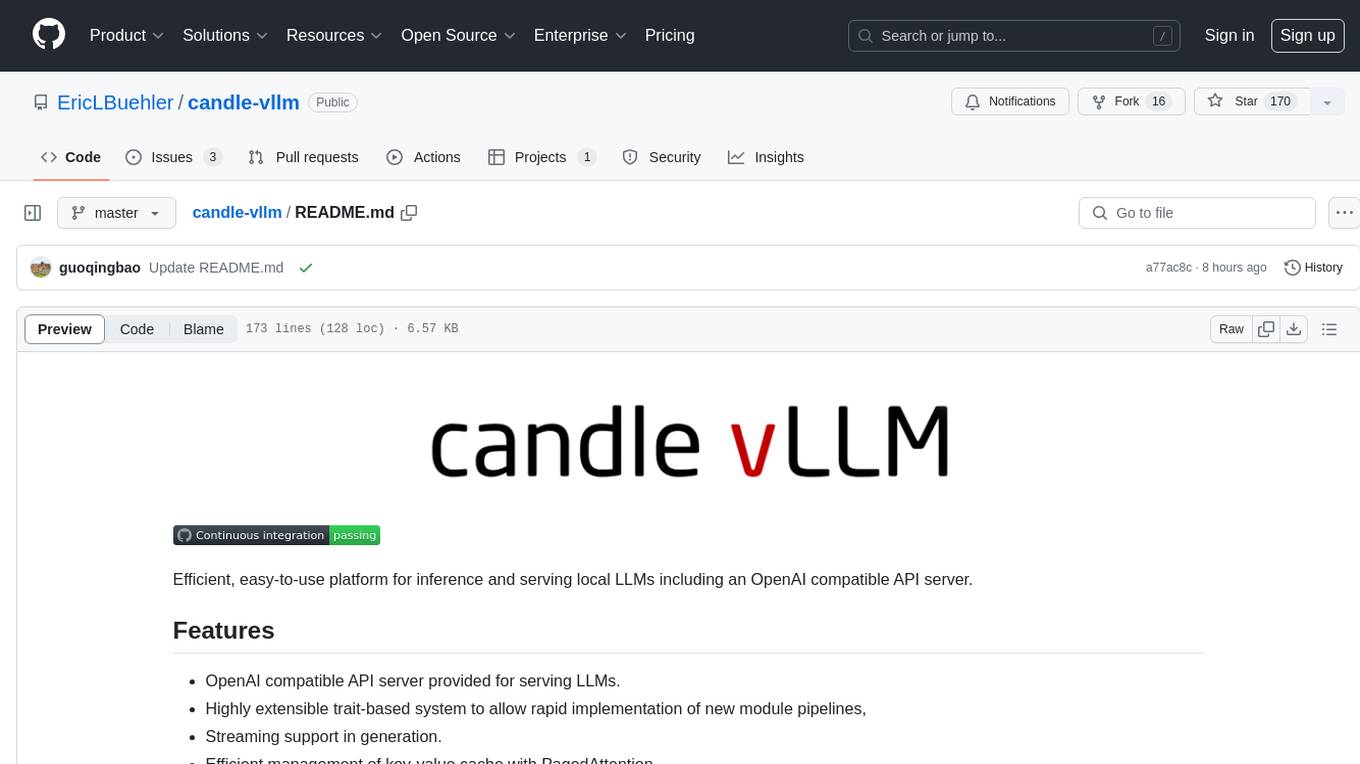
candle-vllm
Candle-vllm is an efficient and easy-to-use platform designed for inference and serving local LLMs, featuring an OpenAI compatible API server. It offers a highly extensible trait-based system for rapid implementation of new module pipelines, streaming support in generation, efficient management of key-value cache with PagedAttention, and continuous batching. The tool supports chat serving for various models and provides a seamless experience for users to interact with LLMs through different interfaces.
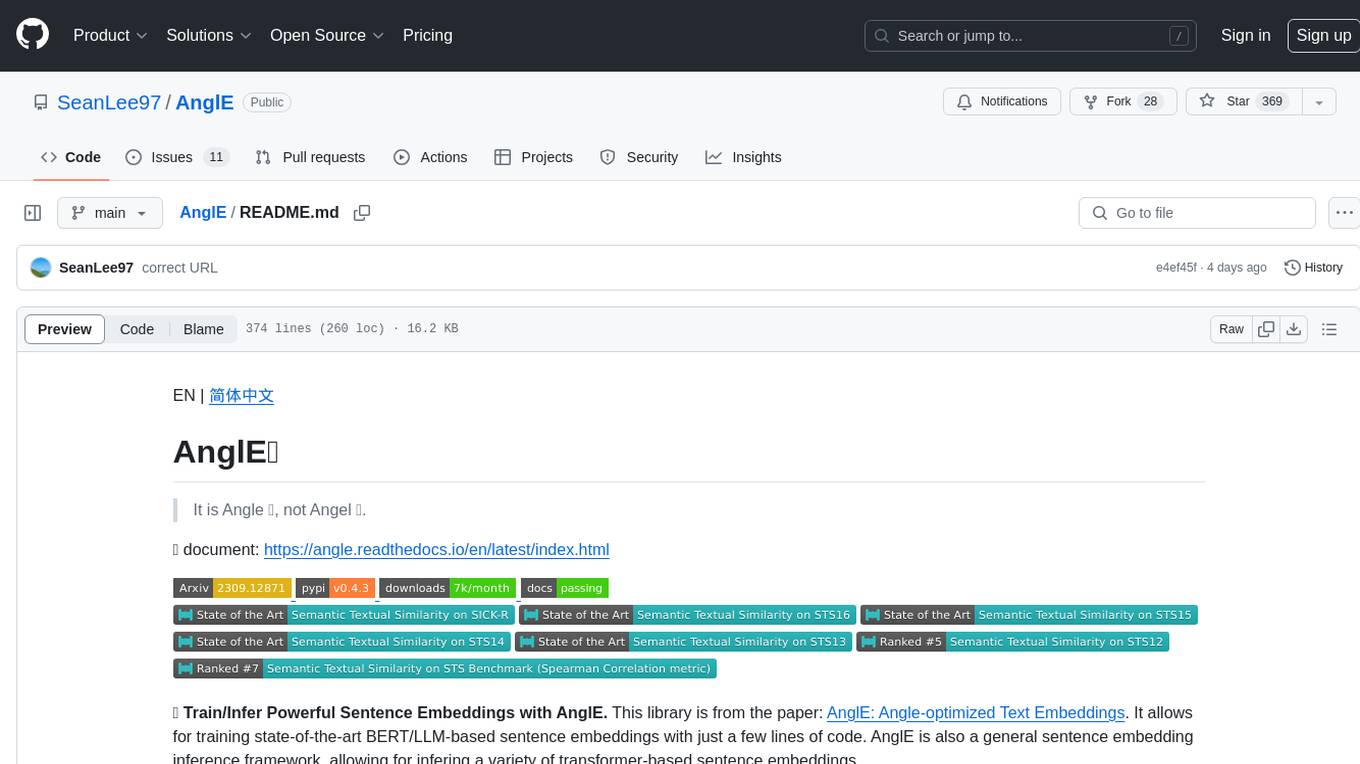
AnglE
AnglE is a library for training state-of-the-art BERT/LLM-based sentence embeddings with just a few lines of code. It also serves as a general sentence embedding inference framework, allowing for inferring a variety of transformer-based sentence embeddings. The library supports various loss functions such as AnglE loss, Contrastive loss, CoSENT loss, and Espresso loss. It provides backbones like BERT-based models, LLM-based models, and Bi-directional LLM-based models for training on single or multi-GPU setups. AnglE has achieved significant performance on various benchmarks and offers official pretrained models for both BERT-based and LLM-based models.
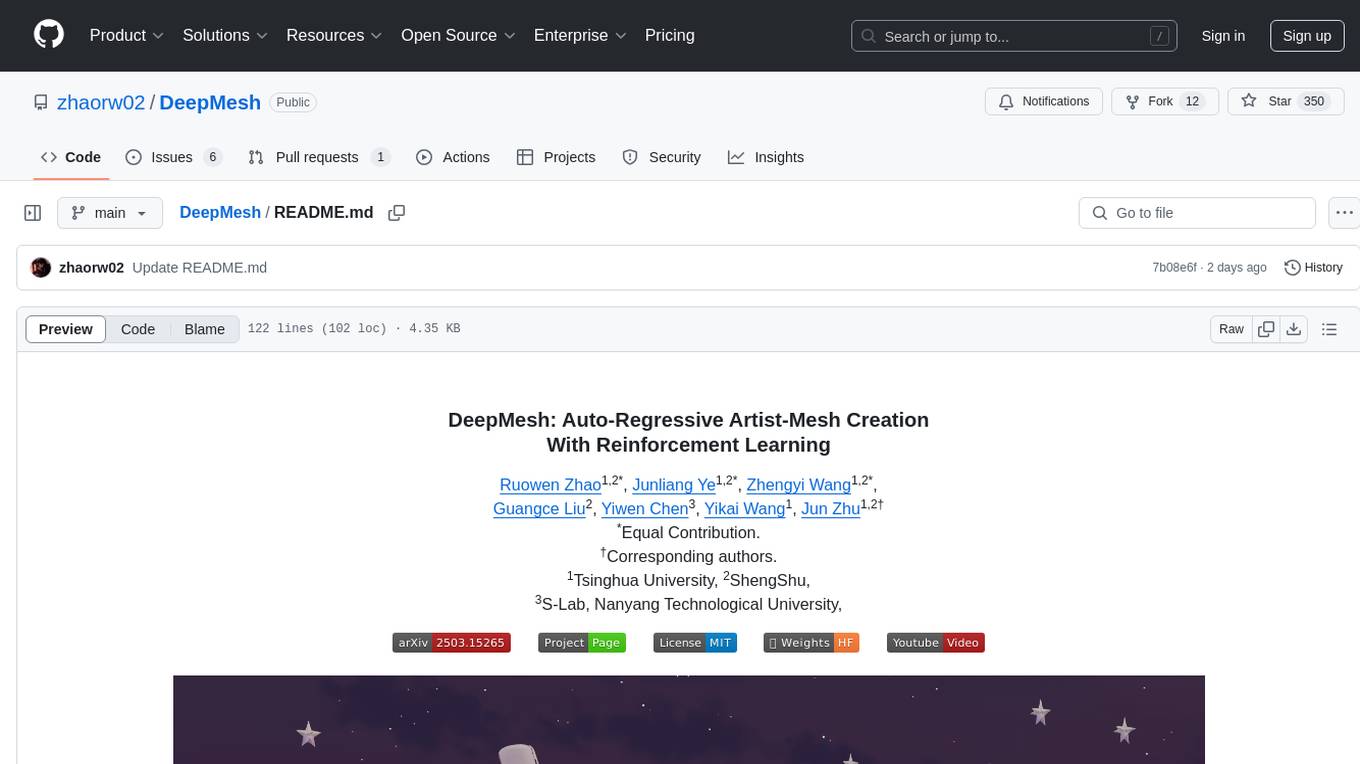
DeepMesh
DeepMesh is an auto-regressive artist-mesh creation tool that utilizes reinforcement learning to generate high-quality meshes conditioned on a given point cloud. It offers pretrained weights and allows users to generate obj/ply files based on specific input parameters. The tool has been tested on Ubuntu 22 with CUDA 11.8 and supports A100, A800, and A6000 GPUs. Users can clone the repository, create a conda environment, install pretrained model weights, and use command line inference to generate meshes.
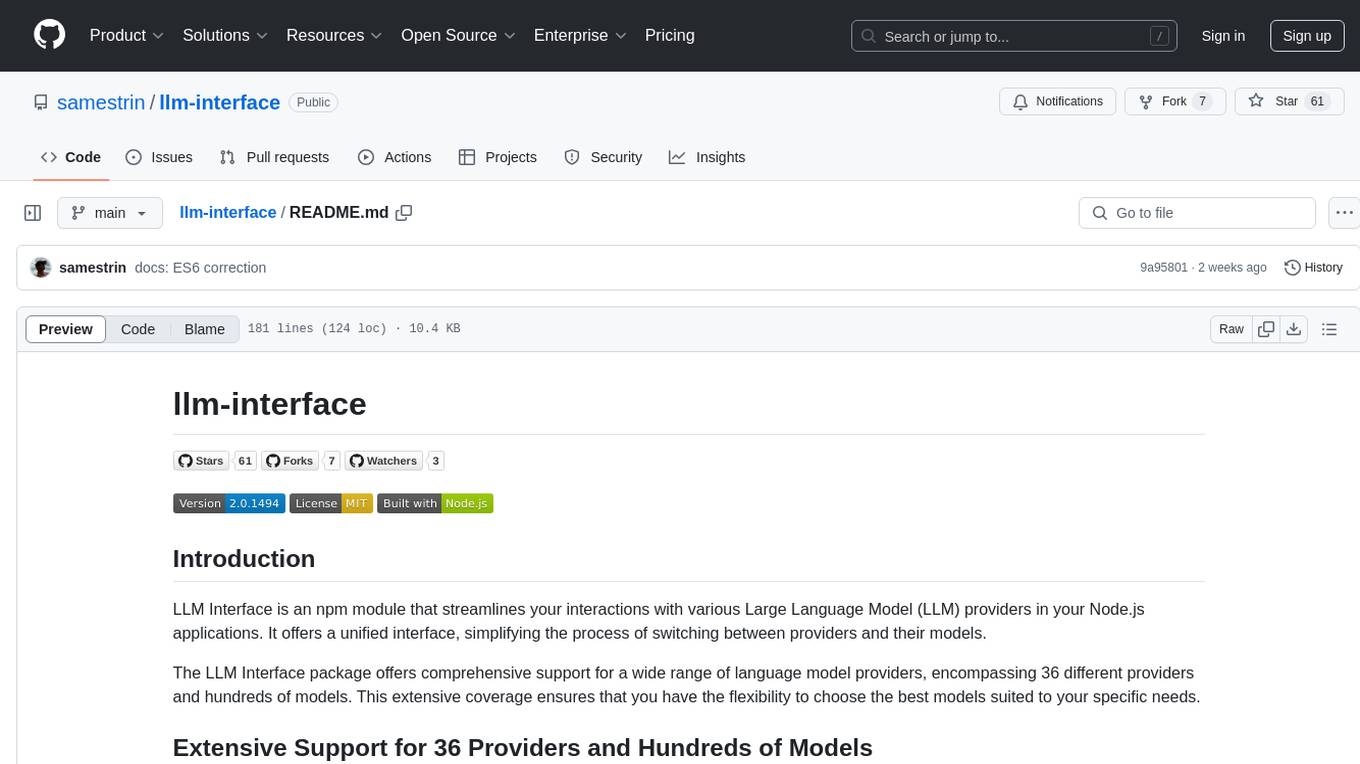
llm-interface
LLM Interface is an npm module that streamlines interactions with various Large Language Model (LLM) providers in Node.js applications. It offers a unified interface for switching between providers and models, supporting 36 providers and hundreds of models. Features include chat completion, streaming, error handling, extensibility, response caching, retries, JSON output, and repair. The package relies on npm packages like axios, @google/generative-ai, dotenv, jsonrepair, and loglevel. Installation is done via npm, and usage involves sending prompts to LLM providers. Tests can be run using npm test. Contributions are welcome under the MIT License.
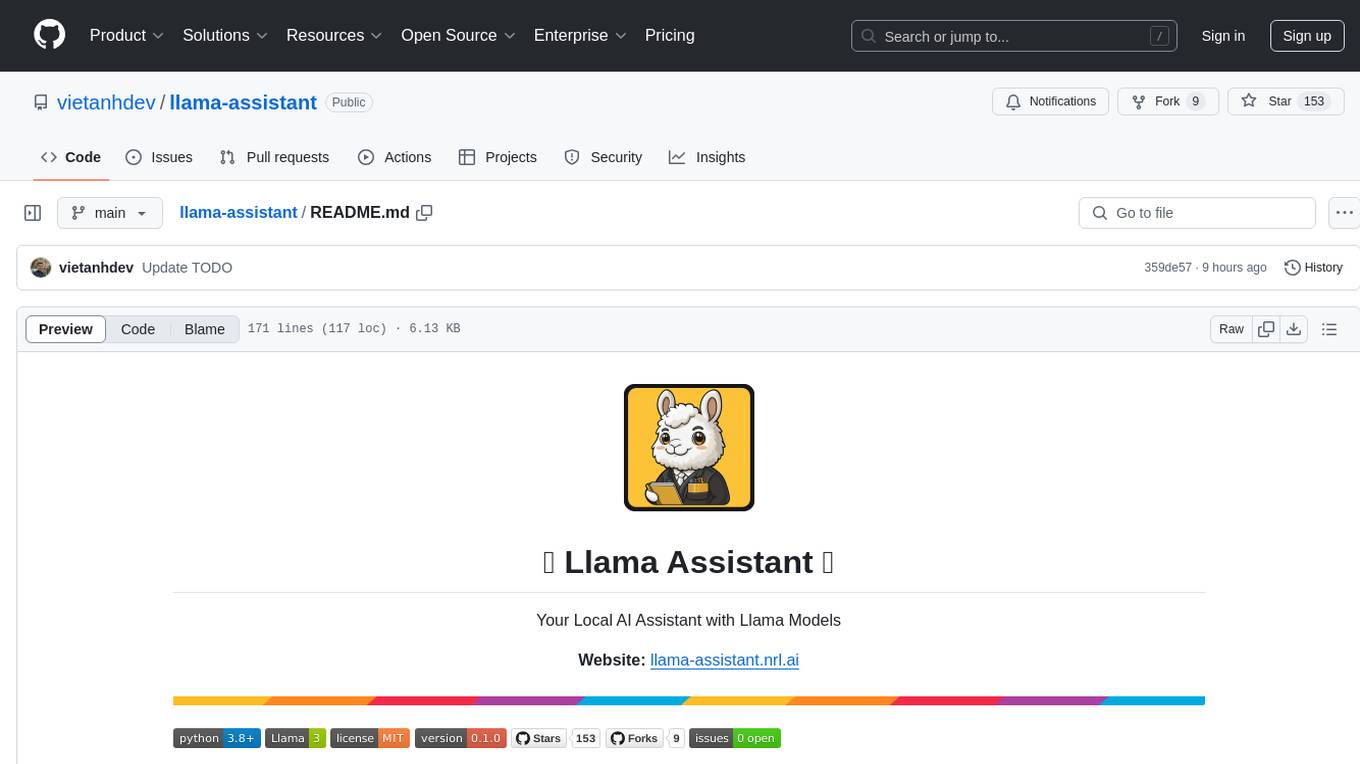
llama-assistant
Llama Assistant is an AI-powered assistant that helps with daily tasks, such as voice recognition, natural language processing, summarizing text, rephrasing sentences, answering questions, and more. It runs offline on your local machine, ensuring privacy by not sending data to external servers. The project is a work in progress with regular feature additions.
For similar tasks
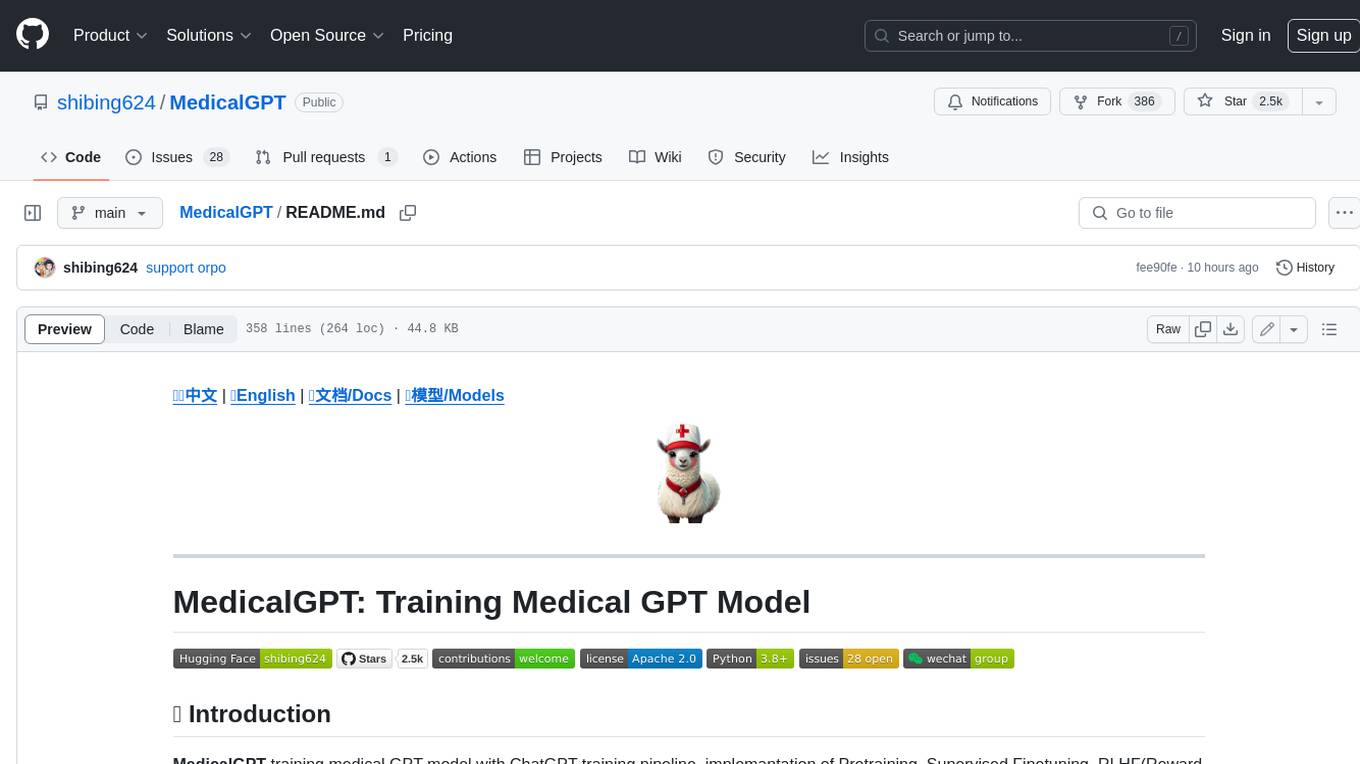
MedicalGPT
MedicalGPT is a training medical GPT model with ChatGPT training pipeline, implement of Pretraining, Supervised Finetuning, RLHF(Reward Modeling and Reinforcement Learning) and DPO(Direct Preference Optimization).

Apollo
Apollo is a multilingual medical LLM that covers English, Chinese, French, Hindi, Spanish, Hindi, and Arabic. It is designed to democratize medical AI to 6B people. Apollo has achieved state-of-the-art results on a variety of medical NLP tasks, including question answering, medical dialogue generation, and medical text classification. Apollo is easy to use and can be integrated into a variety of applications, making it a valuable tool for healthcare professionals and researchers.
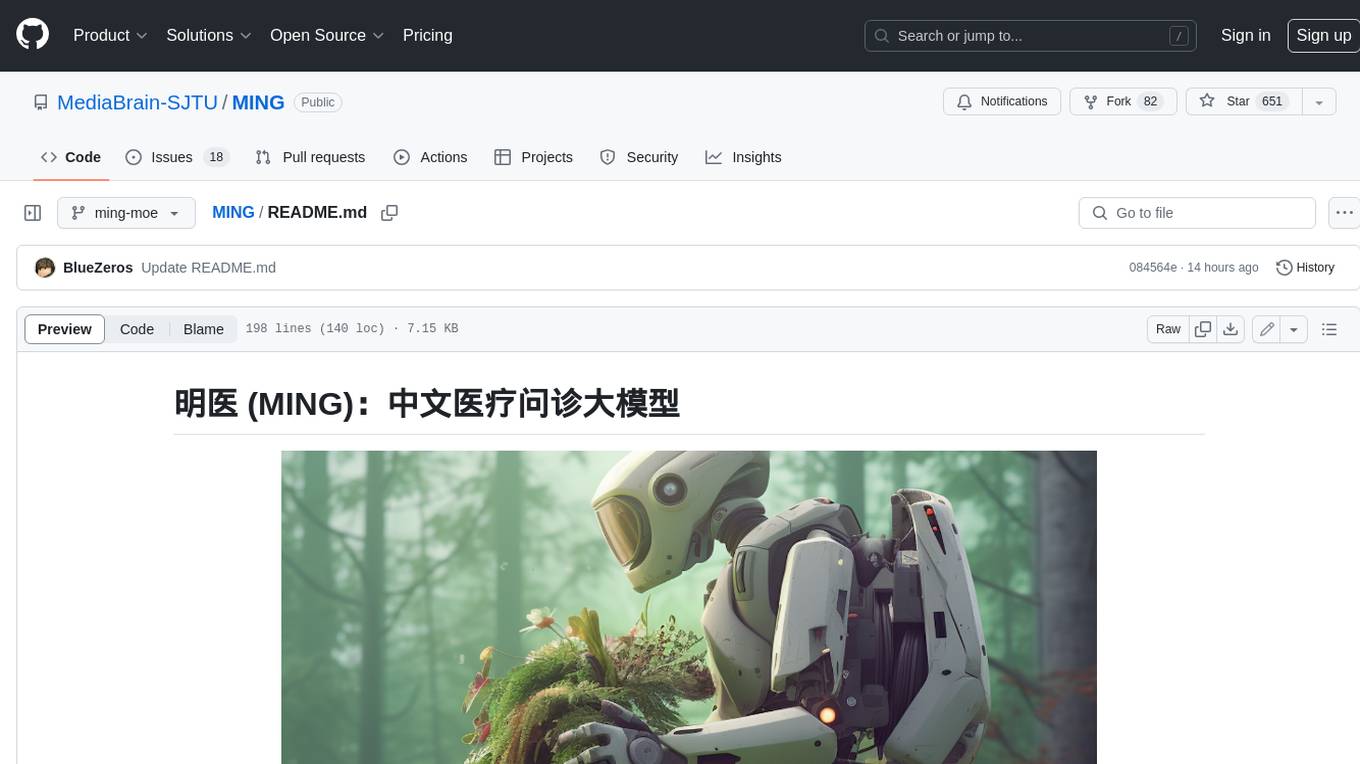
MING
MING is an open-sourced Chinese medical consultation model fine-tuned based on medical instructions. The main functions of the model are as follows: Medical Q&A: answering medical questions and analyzing cases. Intelligent consultation: giving diagnosis results and suggestions after multiple rounds of consultation.
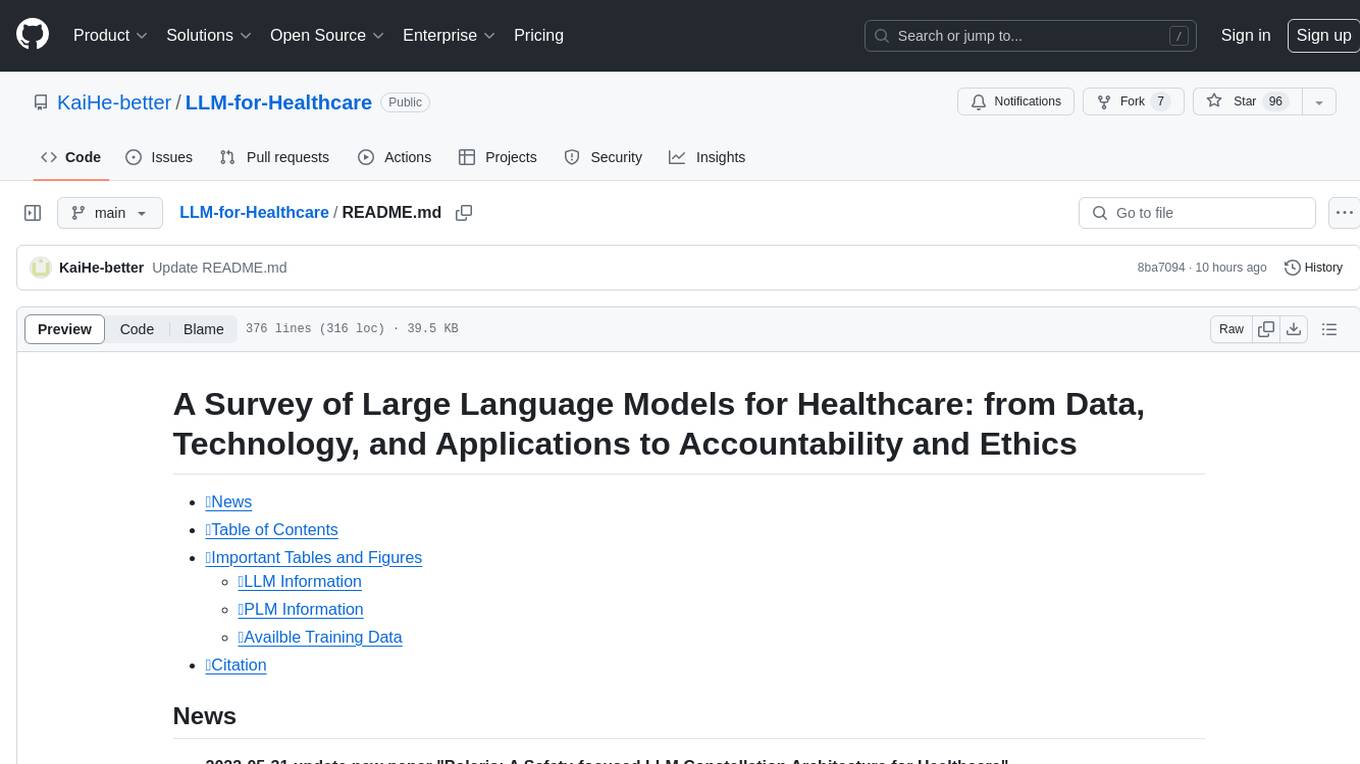
LLM-for-Healthcare
The repository 'LLM-for-Healthcare' provides a comprehensive survey of large language models (LLMs) for healthcare, covering data, technology, applications, and accountability and ethics. It includes information on various LLM models, training data, evaluation methods, and computation costs. The repository also discusses tasks such as NER, text classification, question answering, dialogue systems, and generation of medical reports from images in the healthcare domain.
For similar jobs

MedicalGPT
MedicalGPT is a training medical GPT model with ChatGPT training pipeline, implement of Pretraining, Supervised Finetuning, RLHF(Reward Modeling and Reinforcement Learning) and DPO(Direct Preference Optimization).
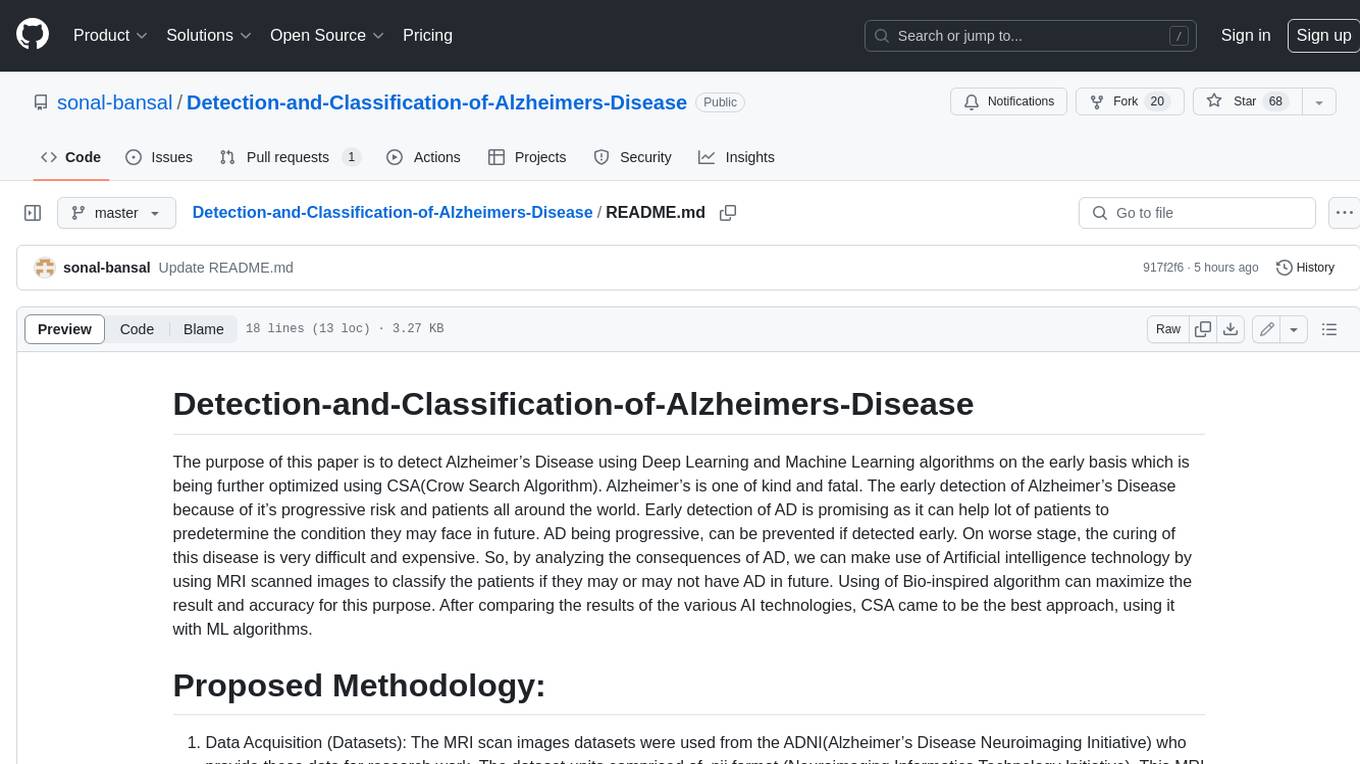
Detection-and-Classification-of-Alzheimers-Disease
This tool is designed to detect and classify Alzheimer's Disease using Deep Learning and Machine Learning algorithms on an early basis, which is further optimized using the Crow Search Algorithm (CSA). Alzheimer's is a fatal disease, and early detection is crucial for patients to predetermine their condition and prevent its progression. By analyzing MRI scanned images using Artificial Intelligence technology, this tool can classify patients who may or may not develop AD in the future. The CSA algorithm, combined with ML algorithms, has proven to be the most effective approach for this purpose.
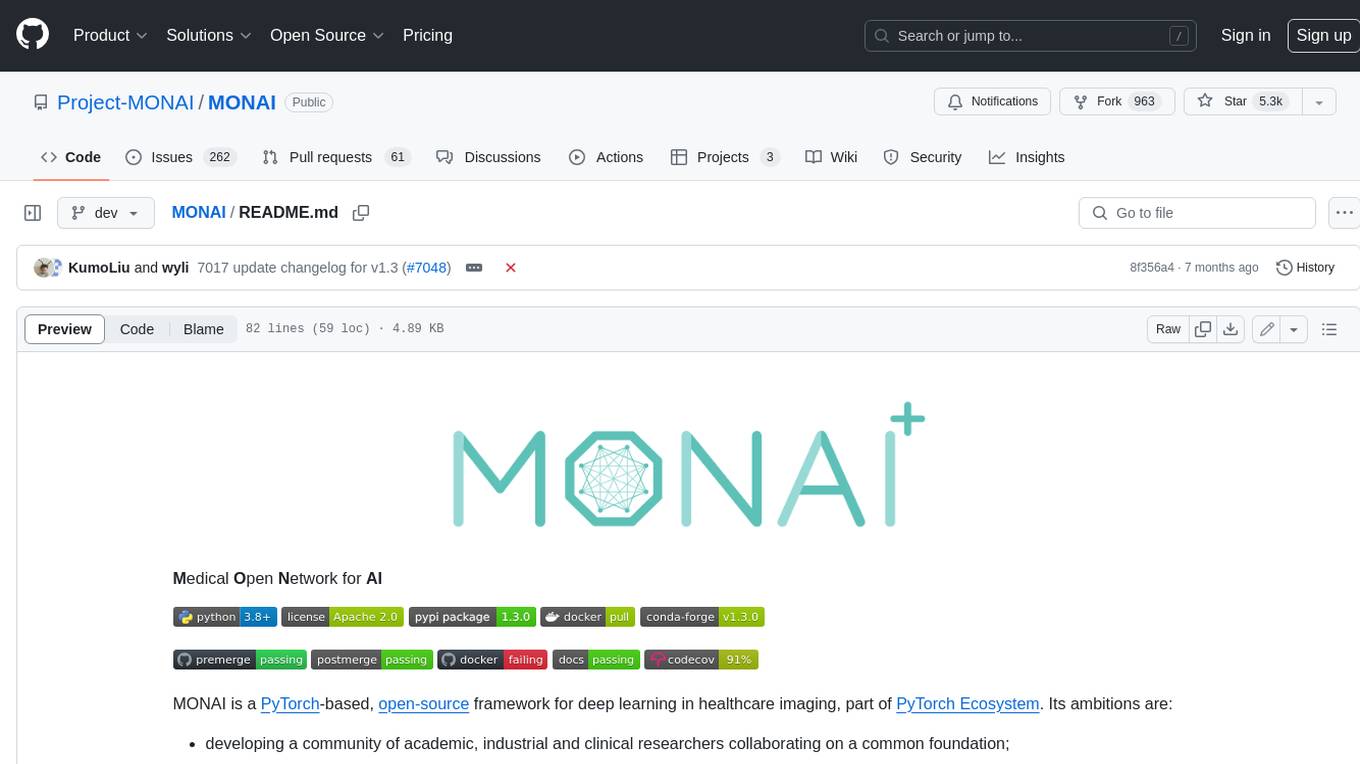
MONAI
MONAI is a PyTorch-based, open-source framework for deep learning in healthcare imaging. It provides a comprehensive set of tools for medical image analysis, including data preprocessing, model training, and evaluation. MONAI is designed to be flexible and easy to use, making it a valuable resource for researchers and developers in the field of medical imaging.

Apollo
Apollo is a multilingual medical LLM that covers English, Chinese, French, Hindi, Spanish, Hindi, and Arabic. It is designed to democratize medical AI to 6B people. Apollo has achieved state-of-the-art results on a variety of medical NLP tasks, including question answering, medical dialogue generation, and medical text classification. Apollo is easy to use and can be integrated into a variety of applications, making it a valuable tool for healthcare professionals and researchers.

Open-Medical-Reasoning-Tasks
Open Life Science AI: Medical Reasoning Tasks is a collaborative hub for developing cutting-edge reasoning tasks for Large Language Models (LLMs) in the medical, healthcare, and clinical domains. The repository aims to advance AI capabilities in healthcare by fostering accurate diagnoses, personalized treatments, and improved patient outcomes. It offers a diverse range of medical reasoning challenges such as Diagnostic Reasoning, Treatment Planning, Medical Image Analysis, Clinical Data Interpretation, Patient History Analysis, Ethical Decision Making, Medical Literature Comprehension, and Drug Interaction Assessment. Contributors can join the community of healthcare professionals, AI researchers, and enthusiasts to contribute to the repository by creating new tasks or improvements following the provided guidelines. The repository also provides resources including a task list, evaluation metrics, medical AI papers, and healthcare datasets for training and evaluation.
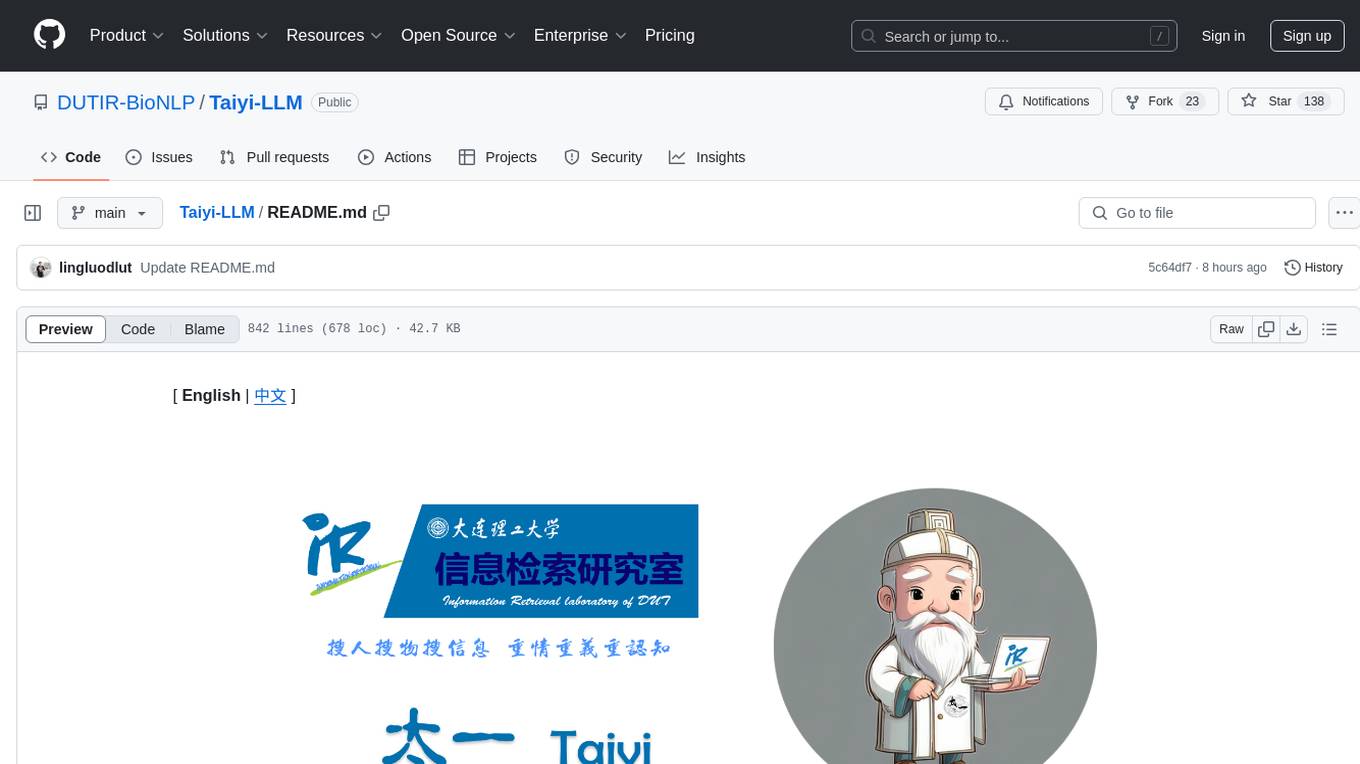
Taiyi-LLM
Taiyi (太一) is a bilingual large language model fine-tuned for diverse biomedical tasks. It aims to facilitate communication between healthcare professionals and patients, provide medical information, and assist in diagnosis, biomedical knowledge discovery, drug development, and personalized healthcare solutions. The model is based on the Qwen-7B-base model and has been fine-tuned using rich bilingual instruction data. It covers tasks such as question answering, biomedical dialogue, medical report generation, biomedical information extraction, machine translation, title generation, text classification, and text semantic similarity. The project also provides standardized data formats, model training details, model inference guidelines, and overall performance metrics across various BioNLP tasks.
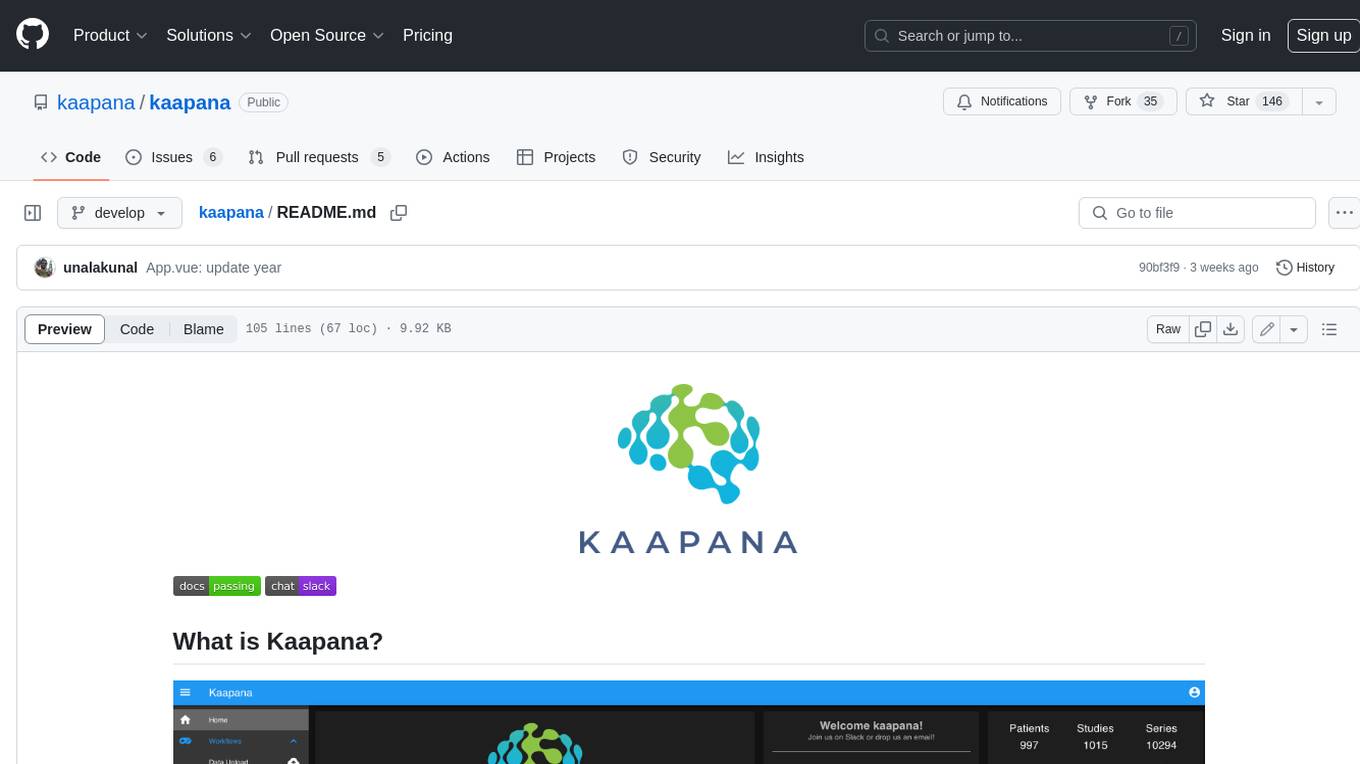
kaapana
Kaapana is an open-source toolkit for state-of-the-art platform provisioning in the field of medical data analysis. The applications comprise AI-based workflows and federated learning scenarios with a focus on radiological and radiotherapeutic imaging. Obtaining large amounts of medical data necessary for developing and training modern machine learning methods is an extremely challenging effort that often fails in a multi-center setting, e.g. due to technical, organizational and legal hurdles. A federated approach where the data remains under the authority of the individual institutions and is only processed on-site is, in contrast, a promising approach ideally suited to overcome these difficulties. Following this federated concept, the goal of Kaapana is to provide a framework and a set of tools for sharing data processing algorithms, for standardized workflow design and execution as well as for performing distributed method development. This will facilitate data analysis in a compliant way enabling researchers and clinicians to perform large-scale multi-center studies. By adhering to established standards and by adopting widely used open technologies for private cloud development and containerized data processing, Kaapana integrates seamlessly with the existing clinical IT infrastructure, such as the Picture Archiving and Communication System (PACS), and ensures modularity and easy extensibility.

MING
MING is an open-sourced Chinese medical consultation model fine-tuned based on medical instructions. The main functions of the model are as follows: Medical Q&A: answering medical questions and analyzing cases. Intelligent consultation: giving diagnosis results and suggestions after multiple rounds of consultation.






